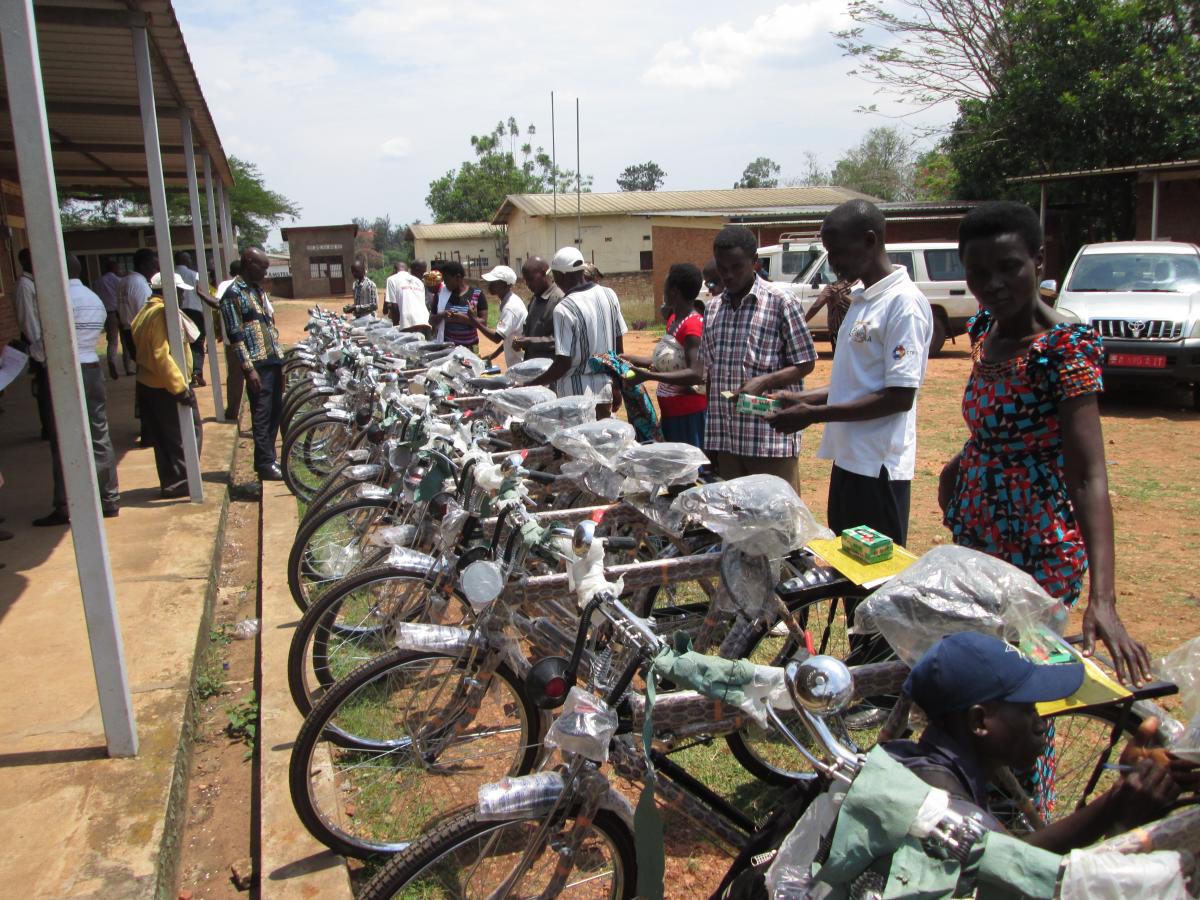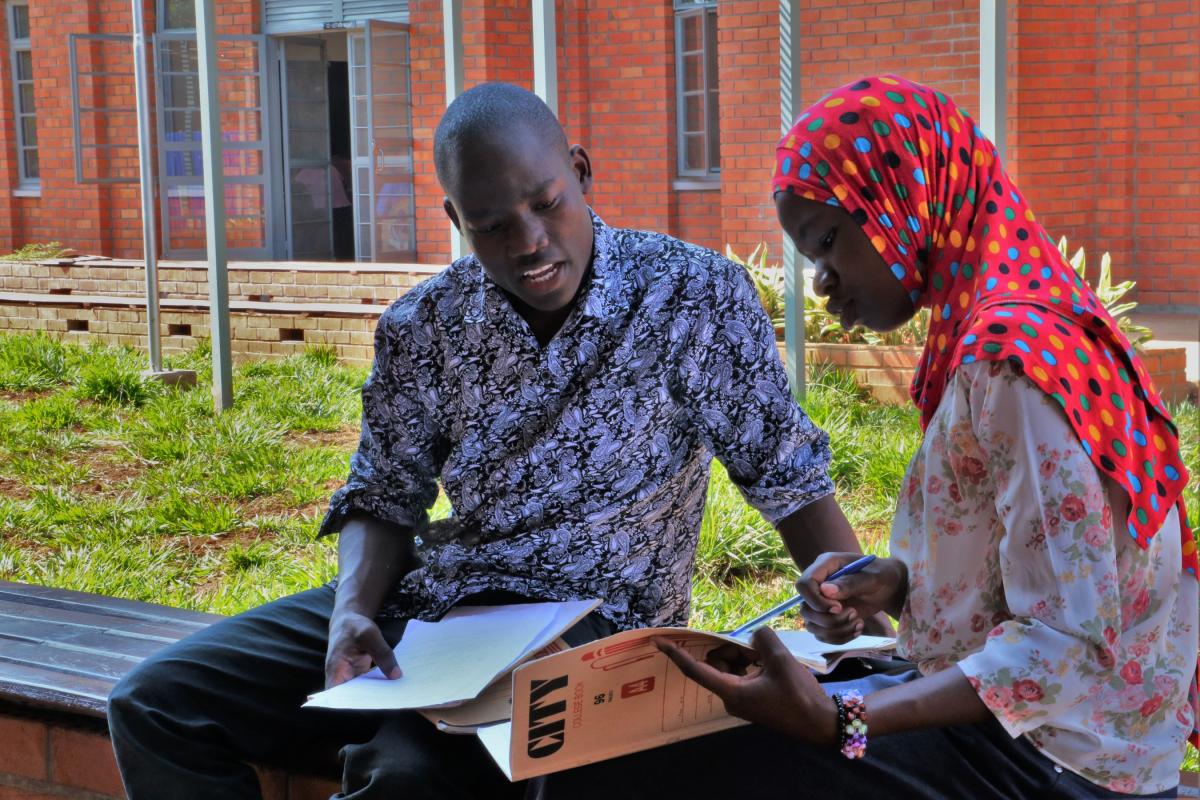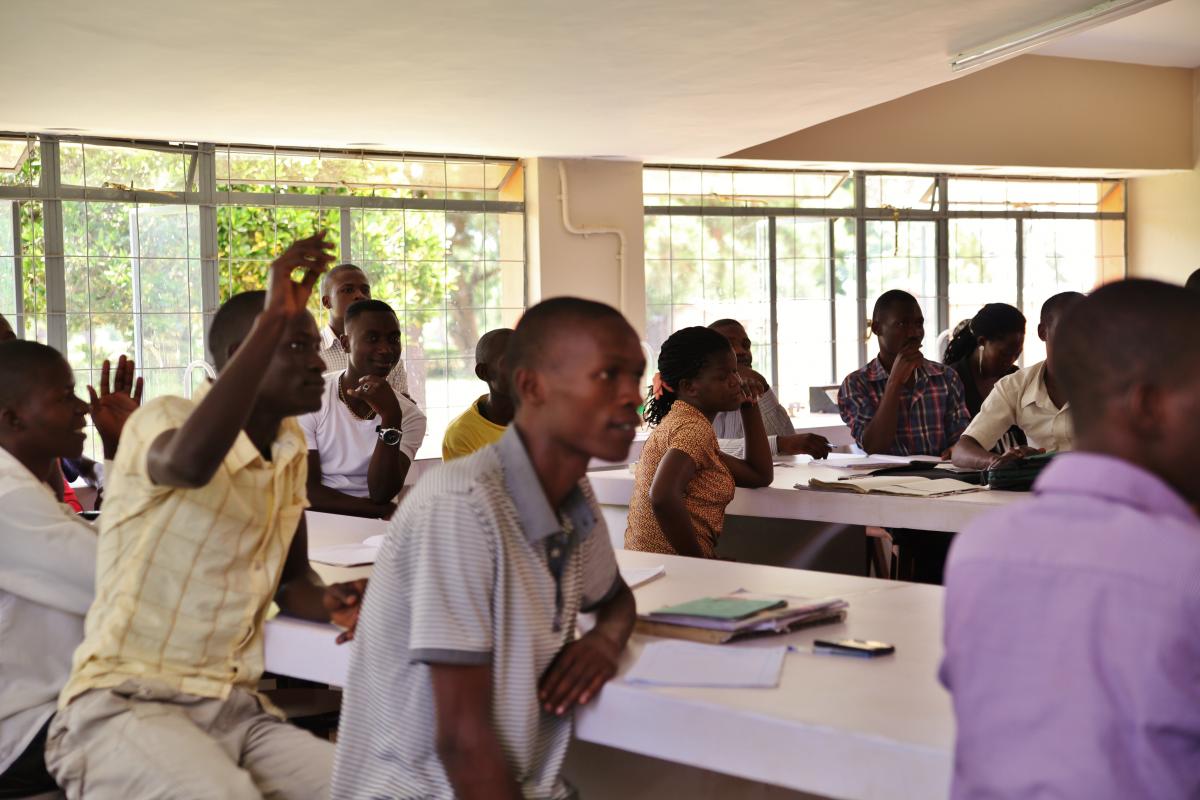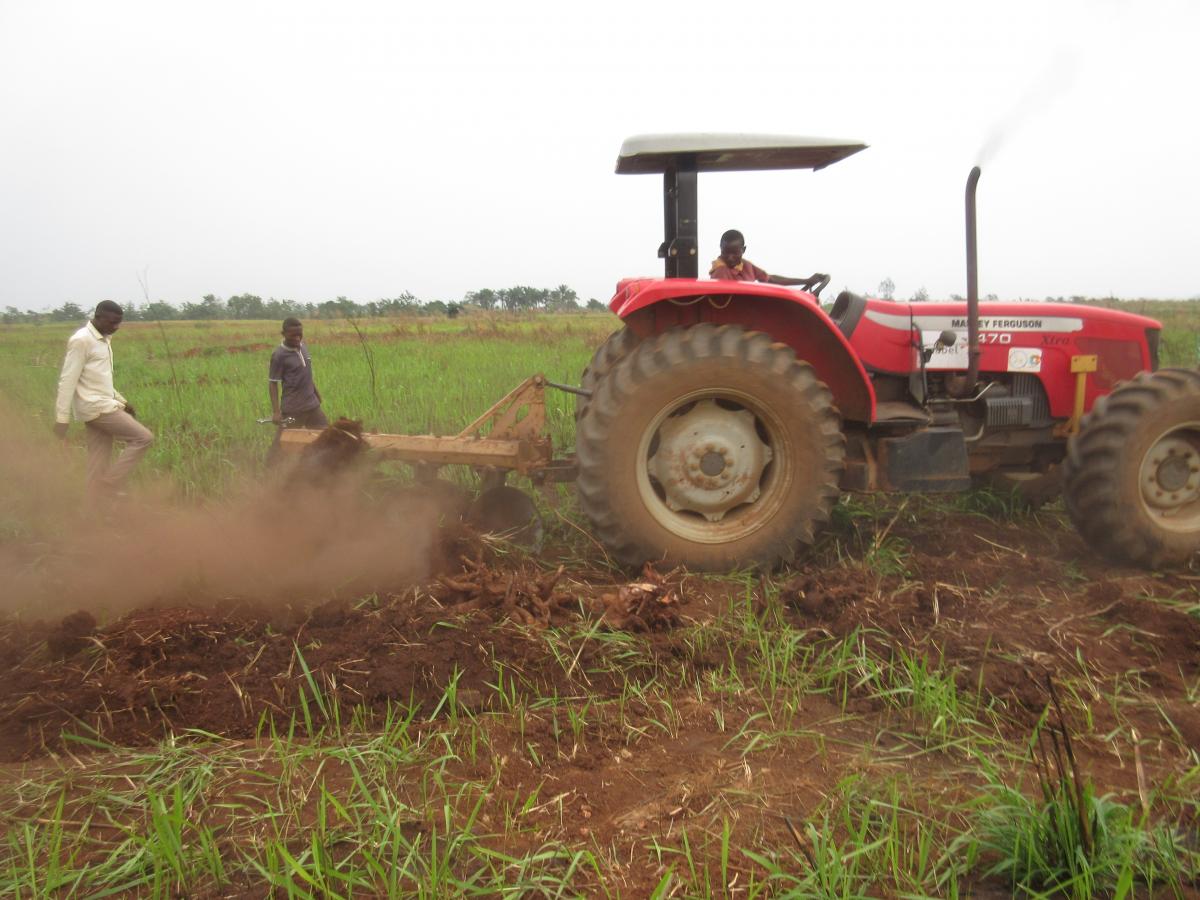Search
Viewing 2430 to 2445 of 3097 news
-
Enabel > PAIOSA : un partenaire pour l’agriculture familiale burundaise
Pascale LEPOINT | 30/10/2018
Enabel (Agence belge de développement) Burundi, à travers son Programme d’Appui Institutionnel et Opérationnel au Secteur Agricole (PAIOSA), a organisé le vendredi 12 octobre 2018 à Cibitoke, la cérémonie de clôture de la formation de facilitateurs CEP banane de 2ème génération. Par la même occasion, le PAIOSA a procédé à la remise des certificats aux 25 lauréats (11 femmes et 14 hommes) de cette formation. L’approche CEP est une approche de formation non-formelle des adultes, utilisée comme méthode de vulgarisation agricole participative. Les facilitateurs certifiés sont à l’origine d’une association qui ne cesse d’innover dans la filière banane.Remise des certificats à l’endroit de 25 facilitateurs de l’approche Champ Ecole Paysan (CEP) à CibitokeAfin de réduire les problèmes liés à l’insécurité alimentaire et nutritionnelle au Burundi, l’approche CEP est vulgarisée depuis 2014 par le PAIOSA, dans ses 3 régions d’intervention : l’Imbo, le Moso et le Bugesera.A travers les CEP, le PAIOSA vise le renforcement des capacités des petits producteurs à mieux appréhender et comprendre les contraintes rencontrées et prendre des décisions techniques avisées pouvant améliorer leur système de production. Les CEP contribuent en outre à l’amélioration de la disponibilité alimentaire par l’augmentation des rendements et des productions locales orientées dans les filières porteuses. C’est ainsi que 25 producteurs (facilitateurs) ont suivi une formation qui a duré 1 an et 5 mois, période correspondant au cycle cultural de la banane. Ces derniers ont pu acquérir et développer de nouvelles connaissances sur cette culture. En plus des certificats décernés, les lauréats ont reçu chacun un vélo comme outil de travail pour la vulgarisation.Une appréciation de la Directrice du BPEAE qui a suivi de près le déroulement de la formation des facilitateursDans son discours lors de la cérémonie de certification, Mme Béatrice NYABENDA, directrice du BPEAE (Bureau Provincial de l’Environnement, de l’Agriculture et de l’Elevage) Cibitoke, n’a pas manqué de souligner : « L’insécurité alimentaire est un défi majeur auquel le Gouvernement burundais fait face à l’échelle nationale mais aussi une préoccupation importante pour la province de Cibitoke. Elle a en outre ajouté :« L’approche CEP utilisée par Enabel / PAIOSA dans les bananeraies de la province de Cibitoke (traduction littérale « terre des bananes ») contribue sans nul doute à retrouver leur essor d’antan ».Par ailleurs, la Directrice du BPEAE Cibitoke a félicité les 25 lauréats de cette formation pour le travail accompli et les a encouragés à former d’autres groupements, comme ils ont déjà commencé à le faire, afin de transmettre les connaissances acquises à leurs compatriotes pour un meilleur rendement sur la culture de la banane tout en améliorant leur niveau de vie.Les facilitateurs de 2ème génération à l’origine d’une association pour la promotion et la commercialisation de la culture de la bananeL’idée de s’associer est rapidement née parmi les facilitateurs, comme le précise Albert NDIKUMANA, Président de cette association : « Notre association « MFURAZABARIMYI » (Agriculteurs modèles) a été créée au début de l’année 2018, au moment où on suivait les formations CEP. Nous avons ainsi loué ensemble un terrain de 3 ha que nous avons prévu d’exploiter pendant 4 ans. Nous y avons planté 3.000 rejets de bananiers sains issus de champs certifiés indemnes du virus du Bunchy top (BBTV) et du flétrissement bactérien (BXW), et les récoltes s’annoncent satisfaisantes ».L’exploitation du terrain a permis aux membres de cette association de générer des revenus supplémentaires comme le témoigne Gérard BURIKUKIYE, trésorier de cette association : « Quand les plants étaient encore jeunes, nous avons cultivé du maïs, du soja puis des arachides en culture intercalaire. Une partie de la production a été distribuée aux membres de l’association tandis que l’autre a été vendue afin de constituer un fond de roulement pour l’exploitation du terrain ».Une exploitation modèle certifiée par l’Office National de Contrôle et de Certification des Semences (ONCCS)En août 2018, l’association MFURAZABARIMYI a sollicité et obtenu des services de l’ONCCS la certification « BBTV / BXW - free » de leur champ collectif de bananiers.L’association espère tirer profit de cette certification en vendant des rejets de qualité auprès des agriculteurs de la région et des organisations œuvrant dans le domaine de l’agriculture.Dans le but également de trouver un marché d’écoulement de leurs productions, cette association a participé avec l’appui de Enabel / PAIOSA à la Foire Nationale Agricole organisée du 04 au 07 septembre 2018 à Bujumbura. « La participation à la Foire Nationale Agricole du Burundi nous a permis de nouer des contacts avec d’autres acteurs de la filière banane, notamment des producteurs, transformateurs et commerçants. A titre d’exemple, nous avons conclu un contrat de vente avec un particulier qui s’est engagé à nous acheter 50 régimes de banane par semaine », se réjouit Gérard qui représentait l’association lors de la Foire Nationale Agricole.L’engagement de la Belgique dans le secteur agricole au BurundiAu total, plus de 58 millions d’euros sont investis sur financement du Royaume de Belgique dans le secteur agricole burundais par Enabel à travers le PAIOSA. Ce financement est alloué pour appuyer différentes interventions à savoir : Micro-projets et Projets d’Entrepreneuriat Agricole ;Infrastructures hydro-agricoles ;Accompagnement d’associations paysannes afin de les aider à assurer efficacement leur rôle dans le développement rural (Organisations de Producteurs et Associations d’Usagers de l’Eau) ;Systèmes de productions agricoles (Champs Ecoles Paysans, Exploitations Familiales Intégrées et Intrants de qualité).Depuis 2014, Enabel / PAIOSA, à travers l’approche CEP, a déjà formé 411 facilitateurs-producteurs sur les filières banane, riz et maïs dans les 3 régions d’intervention. Ces facilitateurs ont à leur tour mis en place plus de 1.000 groupements touchant plus de 28.000 producteurs burundais.Liens OpenEnabelPAIOSAhttps://open.enabel.be/en/BDI/2086/p/programme-d-appui-institutionnel-et-oprationnel-au-secteur-agricole-paiosa-amlioration-de-la-comptitivit-du-secteur-agricole.htmlBilan de l’approche Champs Ecoles Paysans PAIOSAhttps://open.enabel.be/en/BDI/2086/653/u/bilan-de-l-approche-champs-ecoles-paysans.htmlLes champs écoles paysans PAIOSA (1)https://open.enabel.be/en/BDI/2086/197/u/les-champs-cole-paysans.htmlLes champs écoles paysans PAIOSA (2)https://open.enabel.be/en/BDI/2086/193/u/les-champs-ecole-paysans.html
-
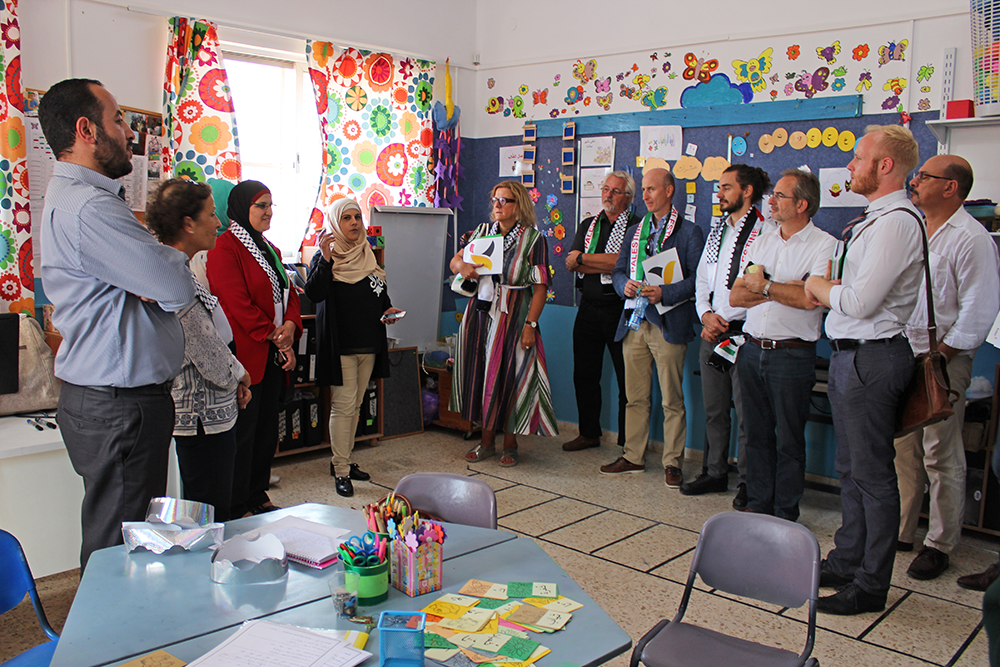
European Union Heads of Cooperation visit East Jerusalem Schools
Laura SCHILLEMANS | 25/10/2018
European Union Heads of Cooperation in Jerusalem and Ramallah visited a number of Palestinian schools in East Jerusalem. The delegation was briefed on the educational situation and the challenges facing Palestinian students and schools. Heads of Cooperation visited two schools in East Jerusalem: Al Rawda Al Haditha in Zaayem and Sheikh Sa'ad Boys School. At Al Rawda Al Haditha in Zaayem, the school administration briefed the delegation on the challenges facing them in their daily work. The principal and the teachers highlighted the achievements of the students who were able to overcome the obstacles and demonstrate strong educational performance. The students' parliament presented the concerns and aspirations of the students. The Belgian Development Agency, Enabel, then presented the work to be done in the context of the future cooperation between the EU and Enabel under ''the resilience in schools in East Jerusalem'' project. The delegation then met the Head of Zaayem Community Council who briefed them about the community that is facing many risks due to the Israeli measures. The group visited later Sheikh Sa'd Boys School where they met with representatives of the local community and school administration. The NGO Terres des Hommes briefed the group on the challenges facing the education system in East Jerusalem and the ongoing efforts to counter the negative consequences on the students' well-being and academic performance.More information: https://eeas.europa.eu/delegations/palestine-occupied-palestinian-territory-west-bank-and-gaza-strip...
-
Enabel Makes Remarkable Strides in Improving Teacher Education
Dorothy KYAMAZIMA | 23/10/2018
Through the Teacher Training Education (TTE) project, Enabel has made tremendous achievements to the education sector. The project has One common goal which is to Improve Secondary Teachers Education in the National Teachers’ Colleges. The TTE Project as per the framework of the Ugandan-Belgian Governmental Cooperation is jointly implemented by Ministry of Education and sports (TIET department) and Enabel (Belgian development agency). The project started its second Phase in 2017 and it will go through 2021. The beneficiaries of the project include: 5 National Teachers’ Colleges (Kabale, Kaliro, Mubende, Muni and Unyama), TIET department, Construction Management Unit, Procurement Disposal Unit and partner secondary schools surrounding the NTCs (3 per NTC). The project has 3 components: The Institutional development component that strengthens the colleges and the Ministry of Education and Sports Management systems. Within this component support is provided to the colleges to develop their planning, finance, human resource and students’ follow-up. Similarly, support is also given to the Ministry of Education and Sports to improve management of the Teacher/Instructor, Education and Training department. Among the achievements in this component are: · A supervision and monitoring system has been put in place to support the 5 NTCs and TIET department. This system has harmonized the NTC work plans and monitored results at college level (committees, NTC management) and national level through the quarterly performance reviews. · The project has strengthened the capacity needs for NTCs through capacity development, ICT management and maintenance and creating safe learning environments. Within this area, the project has prepared capacity development workshops for IT managers in colleges known as the IT days, procured equipment to improve teaching such as laptops, computers, cameras, projectors etc. and provided open-source software for the NTCs. · In order to improve academic management, the project installed a management information system known as ‘Smart Campus’ within NTC Muni and Kaliro and supported support supervision in the colleges through the implementation and dissemination of the Support Supervision guidelines and training of mentors. · To improve human resource management, the project has development and implemented a pilot system of time on task, implemented and disseminated Continuous Professional development guidelines that are aimed at advancing the skills and knowledge of teaching staff. · The project has also set in place a maintenance mechanism to improve the maintenance capacity of the NTCs. Two national workshops were held to this effect and there is on-going procurement for equipment such as energy saving kitchens, solar panels, water harvesting among others that will reduce the operational costs of NTCs. · Similarly, support has been provided to the TIET department through data entry in the teacher registry process, partitioning of the office space, provision of IT equipment and organising teacher education working group meetings. · In order to strengthen the Construction Management Unit (CMU) and Procurement Disposal Unit (PDU), the project is providing IT equipment, site report managing software and a shelving and archiving room for PDU. While institutional management is an important area of support to improve the quality education, the project also extends its support to the area of pedagogy; which is the method and practice of teaching. Through the pedagogy component, the project has achieved the following: · It has strengthened the professional competencies of the NTC academic staff in revision of the general methods course (syllabus for professional studies, data analysis for the use of ICT in colleges), andragogy training process (training of mentors with support from national experts) and participation in different conferences such as the Deta conference held in Rwanda in August 2017, E-learning conference in September 2017 held in Mauritius on ICT4Education and the Aga Khan University conference on Teacher education in October 2017. · The project has facilitated access to information and quality pedagogical content by creating user-friendly libraries. Libraries have been stocked with updated book collections, installation of the Koha library management system in all 5 NTCs, procurement of library kit (photocopiers, binding machines, laminating and papercutting machines), development of a librarian competency profile and membership subscription to the Uganda Library Information Association (ULIA). · Developed and institutionalised a pilot system of Continuous School Practice that is geared towards providing opportunities for teacher trainees to gain experience and teaching skills in surrounding partner secondary schools. To this effect, a Guide and Toolbox for implementation have been drafted and disseminated along with motorbikes to enable teachers to overcome their transport constraints. · The project has created a network of partner secondary schools for school practice and strengthened their pedagogical capacities through creating official collaborations with 17 partner secondary schools, training them on Active Teaching and Learning (ATL), providing them with a start-up kit that includes pedagogical materials and a computer and organising gender missions geared towards creating a safe learning environment and eradicating gender based violence in schools. Providing institutional and pedagogical support is one way to improve the quality of secondary education. In order to take a step further, the project has made a substantial investment in infrastructure with the purpose of creating a conducive learning environment. Through the infrastructure component, the project has rehabilitated, expanded and equipped college facilities. Among the achievements are: · Finalising the design process to improve the pedagogy facilities (laboratories, classrooms and libraries) for NTC Mubende and Kabale and the accommodation facilities for staff and students in Muni and Kaliro. The architectural designs and infrastructural set-up take into account several important factors that focus on innovation, sustainability, energy efficiency and the natural environment. Classrooms benefit from sufficient natural daylight and a well-designed cross ventilation sets off the higher tropical temperatures without any artificial intervention. · Conducting Safe Learning Environment (SLE) walks in colleges in order to identify and address specific security needs such as provision of separate washrooms for female and male students, setting up security lights within the compounds among others.
-
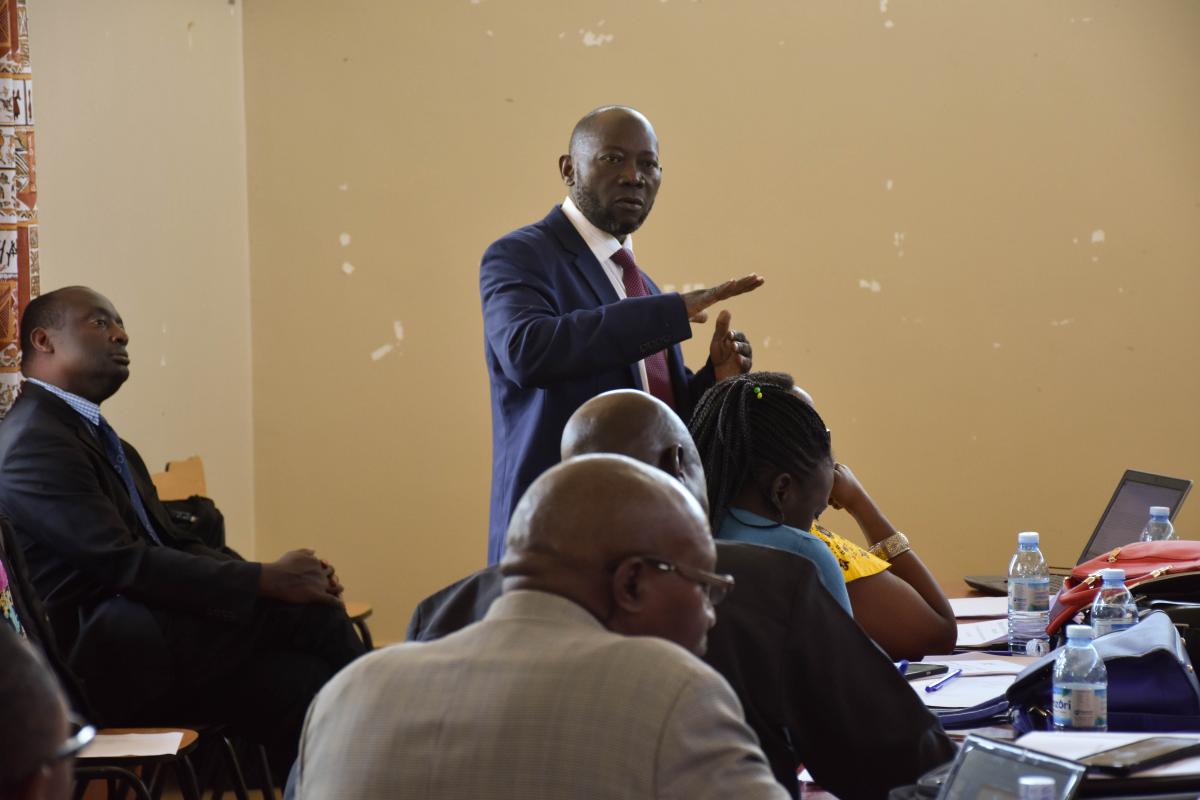
Improving the Performance of National Teachers' Colleges
Dorothy KYAMAZIMA | 23/10/2018
National Teachers’ Colleges (NTCs) in Uganda work with one common goal; to train and produce the best teachers in Uganda. Positioned across the country in Muni, Unyama, Kaliro, Mubende and Kabale; these colleges attract a large number of students hoping to join the teaching profession and become competent teachers within country. With the support from TIET department of the Ministry of Education and Sports and the Teacher Training Education (TTE) project by Enabel, the NTCs have been able to actualize a number of goals and make tremendous achievements towards their improving their own systems and capabilities. This has mainly been realised through the quarterly performance review meetings. The 4th Quarterly Review Meeting After each quarter of implementation, a national monitoring meeting is held on a rotational basis at one of the NTCs and this meeting hosts a vast number of stakeholders ranging from TIET education Commissioner, Education officers, NTC Principals, governing council members, guild student representatives, representatives from Kyambogo University Teacher Training department and Enabel staff. It is through the quarterly review meetings that all stakeholders that support the NTCs review the colleges performance in relation to the access to teacher training services for students across the country, the institution’s management capacities and ensure the best quality teacher training. This July, the NTCs held their 4th quarterly review meeting at NTC Kaliro and the assesment was done based on 3 major areas. Access; which is aimed at increasing access to teacher training, management; which enhances the NTC’s management capacities and finally quality; which enhances the quality of teacher training within the NTCs.The following were the achievements and recommendations realised during the meeting. · Generally, all colleges realised an increase in number of students enrolling and this was due to the different forms of advertising campaigns and communication done · The was an overall improvement in asset maintenance, this included the infrastructure maintenance, availability of electricity and water and implementation of behavioural change workshops on topics such as energy saving, waste management, gender based violence, safe learning environment issues, sexual reproductive health, legal policy frameworks among others. · In the area of management, the workshop identified the need to harmonize work-plans and budgets across colleges but also highlighted improvements in ICT, financial, human resource and academic management within the colleges. · In the area of quality, there were improvements and assessments in the use of Active Teaching and Learning (ATL) in pedagogical preparations, Support Supervision and Continuous School Practice.
-
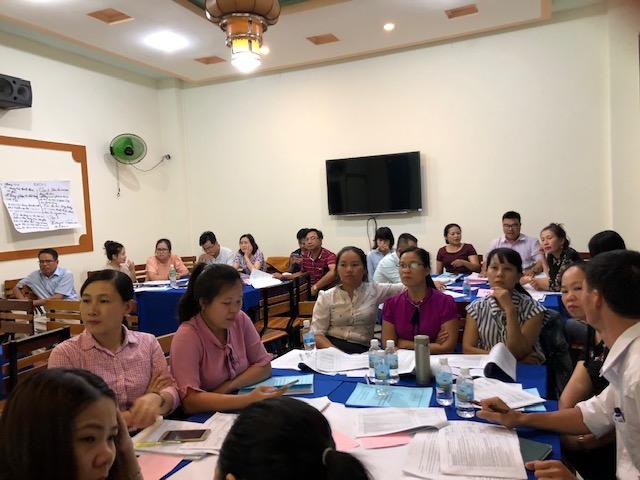
Public Administration Reform plan made bottom up
Marion FISCHER | 22/10/2018
On 18th and 19th October 2018, trainers for districts of Kon Tum province were trained on developing the public administration reform (PAR) plan for 2018. The plans will be developed beginning at the commune level, drawing the approach.mastered through change management tasks from the previous results in implementation of the socio-economic development plan. PAR plans thus will emerge from the real needs of the people in the communes, than be integrated into a planning document at district level and become part of the overall provincial PAR plan. The trained participants learned to apply this logic in the communes. The process is guided by the theory of change.
-
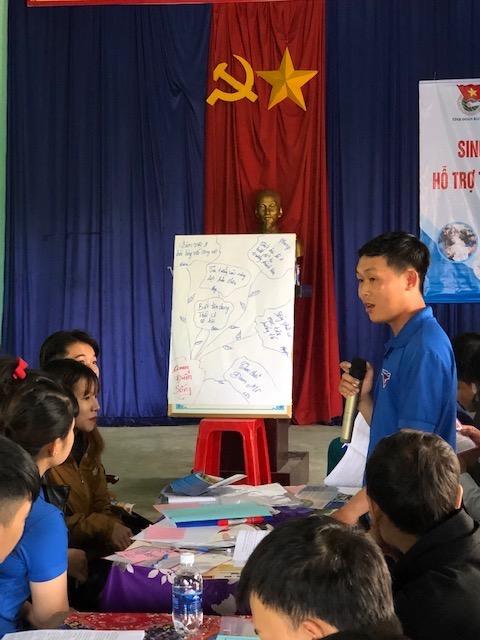
Kon Tum Youth Union reaching out into communes
Marion FISCHER | 22/10/2018
The Kon Tum Youth Union groups hold trainings for multipliers on support to employment orientation and job application. The process is a joint effort of the Youth Union with the provincial Employment Agency. On 19th October 2018, a training of youth group leaders was held in Tran Hung Dao commune. It focused on personal orientation in life and on the values and personal development goals of young people. The trained participants received a training manual on support to young people, who wish to apply for jobs or to engage in a business start-up. Information folders designed together with the Employment Agency, were distributed for reference on job opportunities and contact lines for applications.
-
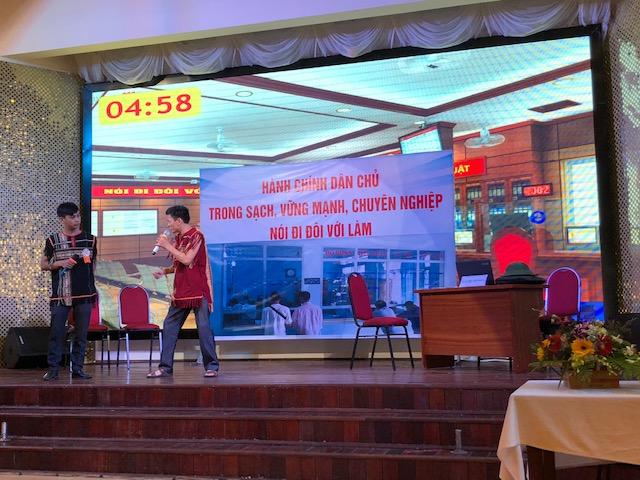
Kon Tum city held contest on implementation of public administration reform
Marion FISCHER | 22/10/2018
On 17th October 2018, the city of Kon Tum held a contest of civil servants from city administrative units and district administrations of the project implementation area about understanding and implementation of the 2018 public administration reform (PAR) plan. The contestants demonstrated a high degree of ability to grasp and implement the government laws and regulations for improvement of public administrative services. They also staged plays to illustrate the effects of implementation of the PAR plan, in which they focused on fighting corruption and bribery through implementing the new regulations and code of conduct in serving the citizens. The contest also featured good practice examples of producing local radio broadcasts and enhancing the information provided to the citizens.
-
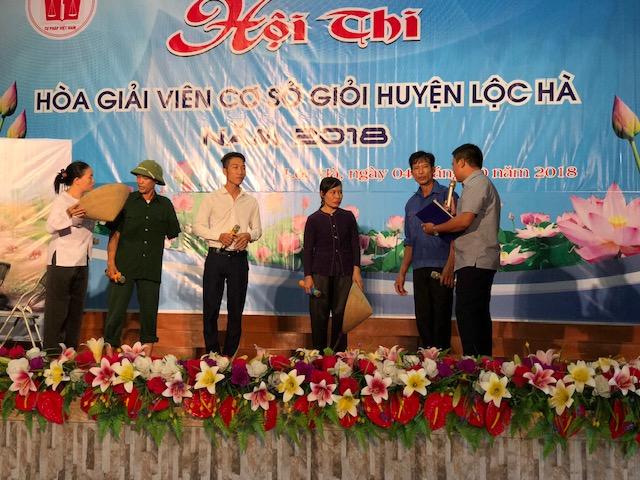
Contest on good local governance for community mediators
Marion FISCHER | 22/10/2018
Civil servants and community mediators of Ha Tinh province held a contest on understanding and implementing public administration reform in Ha Tinh city on 5th October 2018. In the first phase of the contest, the civil servants demonstrated their knowledge of the laws, decrees and regulations which shape the public administration reform. In the second phase, they staged plays about how difficulties and problems of the citizens can be solved better through the reform of public administrative services and through the close cooperation with people's civil society organizations. Contestants showed good understanding of the goals and action steps of public administration reform and displayed their full support for the cause.
-
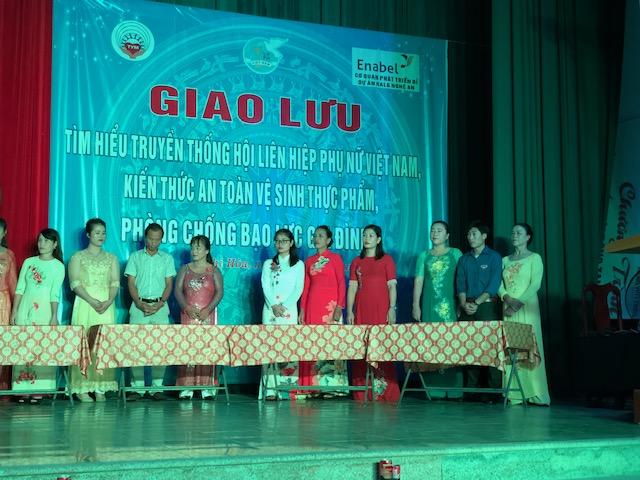
Contest on understanding government regulations
Marion FISCHER | 22/10/2018
In Cua Lo town, Nghe An province, public servants held a contest on understanding an implementation of government regulations on food safety and hygiene in tourism facilities on 4th October 2018. The contestants showed their full understanding of the decrees and regulations in a multiple choice test. After the test the teams staged plays about the application of the standing laws in colorful performances with great enthusiasm and effective outreach to the public.
-

'My skills are my capital'
Sylvia NABANOBA | 16/10/2018
“I don’t have money to use as capital to start a business, but my skills are my capital.” This is 25-year-old Adam Abdu’s statement of faith as he prepares to graduate from Trust Metal Fabrication in Arua town where he has, for the last five months, been an apprentice, learning from a fabrication professional. Abdu is a Ugandan citizen who lives within Rhino Camp refugee settlement and has, since 2012, been out of school. During that time, he did not just sit at home. As a young man with a widowed mother and three young siblings, he felt he had to find a way of supporting the home. “I used to move around the village looking for building sites, where I offered my services as a mason or porter,” he says. “I did not know how to build, but I was willing to learn if someone gave me an opportunity.” Abdu got that opportunity and many more, and never looked back. He kept working on sites, learning and gaining experience. Part of his earnings supported his mother to take care of the home, while he locked up the rest in a bank account, to ensure that he was not tempted to waste them. Abdu’s willingness to learn as well as desire to make something of himself led him to the Centre for Governance and Economic Development (CEGED), a local NGO that had received a grant from Enabel, the Belgian development agency, to run a skills development course for youth. This was under the Support Programme for Refugees and Host Communities in Northern Uganda, funded by the European Union Emergency Trust Fund for Africa (EUTF). Rhino Camp refugee settlement is host to about 90,000 refugees from South Sudan. Uganda has become the largest refugee-hosting country in Africa following the escalation of conflict in South Sudan in July 2016. According to the United Nations High Commissioner for Refugees (UNHCR), about 1,037,898 South Sudanese refugees are registered in Uganda, accounting for 74.4% of the 1.4 million refugees Uganda is hosting as of January 2018. These are distributed among several districts in Northern Uganda, one of which is Arua. The increased number of people in the refugee-hosting areas has placed increased pressure on resources, including schools and employment. In Northern Uganda, formal employment in the region is often scarce, so Enabel, through the European Union Trust Fund, provides funding and expertise for skills training to enable refugees and Ugandan nationals living within the refugee settlements to get skills that can help them get jobs. This is in a bid to improve not only the refugees’ lives but also those of their hosts, something that will promote peaceful co-existence. Abdu’s experience on building sites played a huge role in his selection of what trade to take on. He chose Metal Fabrication and Welding. “Today people prefer metallic fittings to wooden ones,” explains Felix Anguyo, an instructor in Metal Fabrication and Welding at a youth skills training centre in Arua district. “This is mainly for security and durability.” So after the training, Abdu is ready to take on the world. He has skills in making windows, doors, balustrades, curtain rods, beds and many more. Once the training ends, Abdu will sit for examinations managed by the national Directorate of Industrial Training, after which he will get a Worker’s PAS (Practically Acquired Skills), a document that will help him get a job. Abdu would love to have his own workshop, be his own boss and manage his own income. Much as this is his dream, he knows that it cannot be just now. He understands that setting up a business needs money for paying rent, electricity bills, buying raw materials paying employees. He firmly believes that he has the most important thing in his hands – skills – and that will enable his dream of becoming his own employer a reality. “I am going to look for a job and become someone’s employee, but I won’t lose sight of my dream. I will save my money and one day run my own workshop. I want to be the leading professional welder in Arua,” he says. Abdu believes that the relationships he built in the construction industry will enable him get contracts for doors and windows. And that’s not the only dream that Abdu harbours. Having not had a chance to complete his education, he wishes better for his own children. “I would like my children to study up to university. I will also ensure that they learn a skill, so that if they do not get a formal job they can use that skill to earn themselves a living,” he says. Abdu hopes to train further, too. The Worker’s PAS that he will get will not only enable him to work, but to also upgrade his education. He can go on to attain a diploma and even a degree. The sky is certainly the limit for Abdu.
-
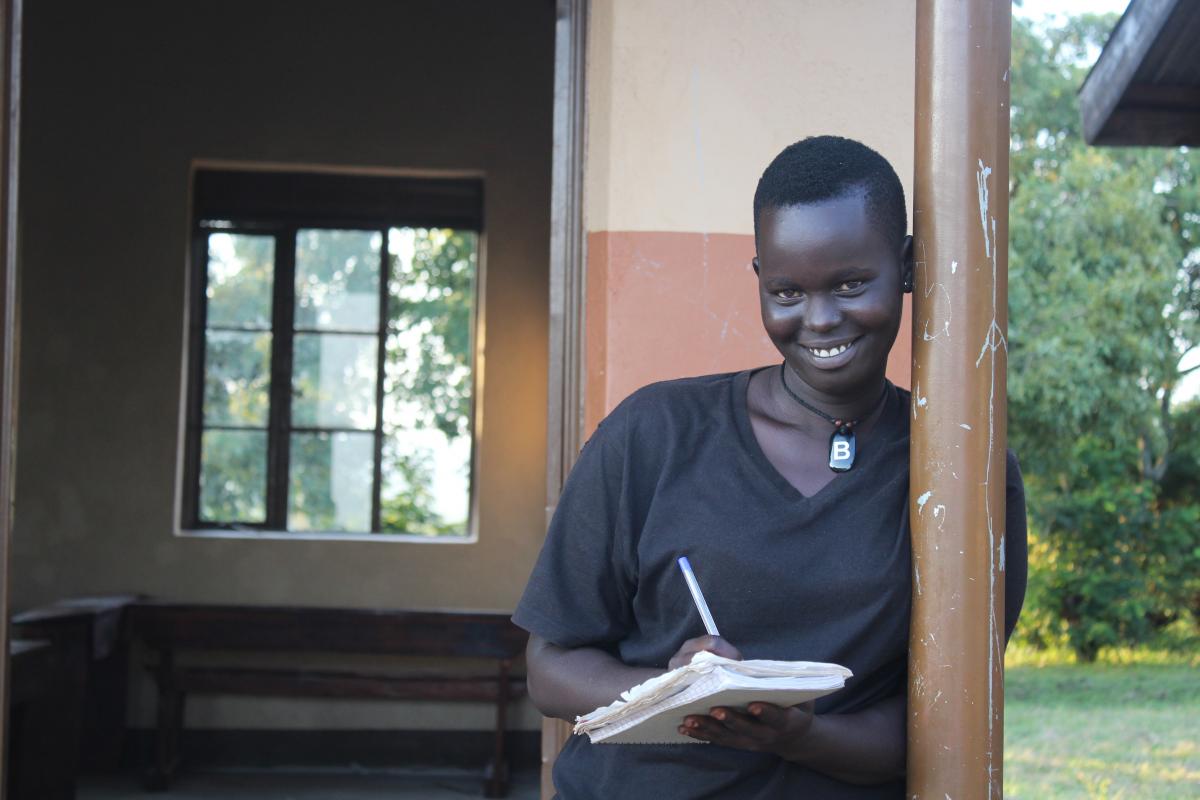
School girl aspires to become midwife to help pregnant refugee women
Sylvia NABANOBA | 16/10/2018
The sun is setting on the horizon, casting a soft orange light on the trees lining the compound of Lokopio Primary School in Bidibidi refugee settlement, Northern Uganda. Children stream out of one particular classroom. Their school mates left one and a half hours ago but the Primary Seven class, which is preparing for their Primary Leaving Examinations, stayed on for revision, just like they have done every day for the past few months. Clutching her books, 18-year-old Susan Sadia, a refugee from South Sudan, readies herself for the long walk home, a journey that will take her about 40 minutes. “I am reading hard so I can become a midwife,” she says. “I want to help the pregnant women suffering in the settlement, especially those who did not come to Uganda with their husbands.” Sadia knows only too well the suffering that refugee women endure. In 2016, she fled fighting in South Sudan with her aunt, cousins and siblings. The journey to safety in Uganda, on foot, across four rivers, some of which did not have bridges, took three days from their home in Yei. Besides the few belongings balancing on her head, Sadia had to carry her three-year-old brother on her back. Her mother had refused to leave South Sudan. Although she had been in school in South Sudan, in 2017 Sadia did not attend school in Uganda. Bidibidi, where she stays, is the largest refugee settlement in the country, hosting about 272,000 refugees, mainly from South Sudan. As with all other services, refugees have to share education facilities with the Ugandan nationals. Uganda recently launched an Education Response Plan for Refugees and Host Communities, against a backdrop of inadequate education services for children in those communities. According to the Plan, the number of children in refugee settlements far overrides the available schools, teachers and learning materials. In Bidibidi settlement, for instance, the pupil teacher ratio is 94:1, compared to a national average of 43:1. Sadia’s fate took a turn for the better in 2018. With funding from the European Union Emergency Trust Fund for Africa, Save the Children, an NGO, started the Accelerated Learning Programme. This is a catch-up programme that uses a compressed curriculum, over three years, to enable children who had dropped out of school to re-enroll. It is run within existing primary schools. Sadia is on the final year and has the opportunity to do the Uganda Primary Leaving Examinations which, she hopes, will be her ticket to secondary school and ultimately her dream of becoming a midwife. “I have seen pregnant women deliver from home because there is no one to help them. No husband to take them to the health centre,” she says. “When I become a midwife I will educate women on the need to go to a health centre to give birth, because that is where you find doctors and midwives who can help.” Sadia’s optimism belies the challenges she faces in the pursuit of her dream. The school does not offer meals for children, so those who stay nearby go home for lunch. “My home is far – I cannot afford to make the journey, so I only eat in the evening,” she says. Sometimes Sadia misses school because she has to take care of the home when her aunt, who sells food in the market, travels to stock up for her stall. She makes up for lost time by revising at night, efforts that are sometimes hampered by the lack of electricity in the settlement. The family’s solar lamp is now worn out and operates intermittently. But she is determined to pass her examinations, drawing inspiration from her family. “My parents did not go to school, so I want to be different. If I get a good education I will be able to help my family,” she says. With this determination, the women of Bidibidi, and later South Sudan, will be fortunate to get such a passionate midwife.
-
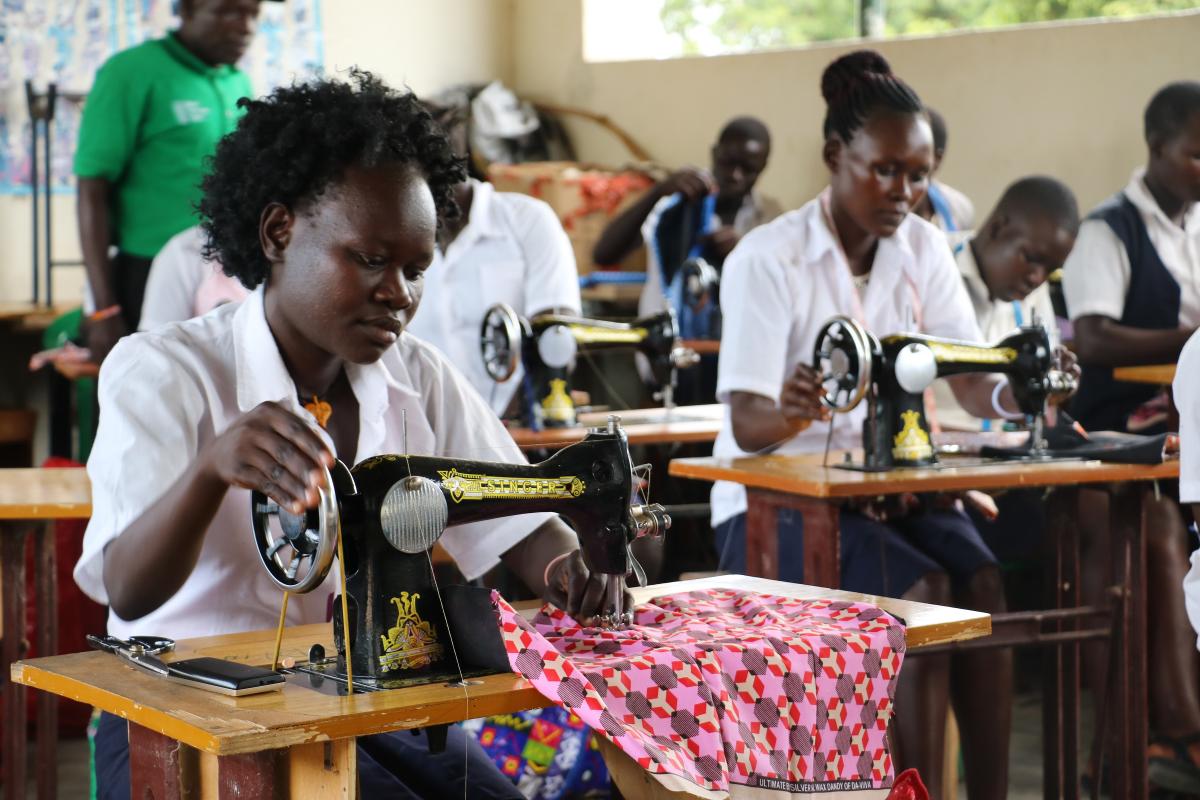
Tenisa sews her way to the future
Sylvia NABANOBA | 16/10/2018
Seventeen-year-old Tenisa Sabbath left her home in South Sudan in August 2016. Fleeing the rising insecurity in her village of Yei, Tenisa joined her elder sister and her husband, along with their five children and together they walked to the Uganda border. Vehicles did not risk the road, as armed men stopped them and robbed whatever little passengers had managed to take with them. A journey that would have taken a couple of days therefore took much longer because of the younger children. A widow, Tenisa’s mother refused to leave South Sudan, saying that she was too old and would be a burden on the way. In Uganda, Tenisa, who had been in secondary school back home in South Sudan, was not able to immediately join school. Since she had attained some level of education, it seemed only fair to let her younger nieces and nephews also get a chance to go to school. “My sister and her husband could not pay the school dues because they also had their own children to think of,” she says. In the primary school, students are required to pay UGX8,000 (USD2) each term as an examination fee, an amount that seems manageable to people in urban areas but not so for those in rural areas such as Rhino Camp refugee settlement. In addition, neither Tenisa’s sister nor her brother-in-law had a source of income, so they could not raise the money. Uganda currently hosts about 1.4 million refugees, 61% of whom are children. The Government endeavours to provide education for all children, including refugees, who are expected to be integrated into the Ugandan education system. While primary school education is more accessible for refugee children, secondary school provision is limited for refugees and host communities in the refugee-hosting districts. According to the Education Response Plan for Refugees and Host Communities in Uganda – 2018, access to secondary education among the refugee population in the refugee-hosting districts remains as low as 11%, with only 33% of these being girls. So for one and a half years, Tenisa could only help prepare her nieces and nephews to go to school, while she stayed home and played a motherly role. This changed one day when some girls in the neighborhood told her about a programme they were on – it was a free programme for children who had dropped out of school but wanted to re-enroll. She therefore enrolled on the final year of the Accelerated Education Programme (AEP). The AEP is a three-year programme that uses a catch-up method or accelerated curriculum to enable children who had dropped out of school to re-enroll and either be reintegrated into the formal education system or take up vocational skills training. Year one takes primary one to three, year two takes primary four and five while year three takes primary six and seven. Although AEP classes take place only in the afternoon, Tenisa was not a regular at school. “I loved studying, but did not attend school regularly as I still had to help in taking care of the home,” she says. So when she did the Primary Leaving Examinations (PLE), Tenisa did not pass well enough to join secondary school. This could be attributed to absenteeism, as well as curriculum differences. Schools in Uganda run on the Uganda education curriculum, a challenge that many refugees face, especially those who rejoin school in higher classes. However, all hope was not lost for Tenisa – she had two options, either to re-sit the PLE examinations or join a vocational skills training institute. She chose the latter and is now confident that that is the best decision she could have made. She is learning tailoring at the Youth Skills Development Centre in Siripi, Rhino Camp refugee settlement. She is one of 100 youth getting training in different skills, funded by the European Union Emergency Trust Fund for Africa. Tenisa is indeed sewing her way to her future, starting with the uniform she is wearing. “I sewed it myself. Each of us in the classroom had to make their own uniform at the beginning of the course,” she says excitedly. When training ends, Tenisa and her classmates will go for internship, during which they will be exposed to the practicalities of the business world. Afterwards they will do their national examinations and on passing get a Worker’s PAS (Practically Acquired Skills), a document that bears their qualifications and enables them to get work. Although the vocational training institute is privately owned and run, it collaborates with the national Directorate of Industrial Training, enabling its trainees to get the requisite skills as well as the necessary recognition they need to be able to work in the country. Life does not look as bleak for Tenisa anymore. She has hope – she knows that this skill will open the door to an independent life as well as a bright future. And if peace returns to South Sudan, she is ready to go back home and set up a life of independence and self-sustenance using the knowledge and skills she gained. “Skills do not rot,” she says. “What I have got here is something that I can use for the rest of my life.”
-
Promoting Active Teaching and Learning Through a Stimulating Environment
Dorothy KYAMAZIMA | 12/10/2018
Insufficient teachers, limited resources, inadequate infrastructure and the over-crowded classrooms are a few of the challenging factors affecting the education sector in Uganda. While a number of interventions are underway to improve the quality of education, focusing on new teaching methods and creating a stimulating environment can make a considerable difference. While access to education has substantially increased over the years, the declining quality of education is still a growing concern for many in Uganda. A large number of schools are afflicted with insufficient teachers, limited equipment and inadequate infrastructure to meet the needs of the growing classroom population. The Teacher Training Education (TTE) project set up by the Belgian development agency and the Ugandan government seeks to address this problem. The project aims at improving the quality of secondary teacher education in National Teachers’ Colleges by strengthening the professional competencies of future teachers and enhancing infrastructure.For quite a long time, teachers have relied on the traditional teacher-centered education styles where they are viewed as the information provider while students simply listen, memorise and take notes. This tactic has proven to limit the skills and knowledge development of students. However, accompanied by the fact that teachers are grappling with large numbers of students in a single classroom, limited teaching resources and poor infrastructure, the quality of education has been severely watered down. One of the main objectives of the TTE project is to improve the quality of teacher training by introducing a learner-centered approach to teaching known as the Active Teaching and Learning (ATL). This means that the learning systems shift focus from the teacher to the student and provoke independent reasoning, problem solving and critical thinking. Through ATL, students are more likely to retain a higher percentage of knowledge and skills because they engage with materials, participate in and out of the classroom and exchange information with their peers. ATL is improving learning in a way that benefits both the teacher and the student. Phionah Namutosi, a student from National Teachers’ College Mubende shared the experience.“During my time as a student, teachers were focused on exams and I found myself not understanding a lot of the subjects in the classroom. Right now with Active Teaching and Learning approach, lessons are more interesting and I gain so much more than before.” “This way of learning is more realistic than theoretical,” explains Nawuma Sarah, a mentor teacher at National Teachers’ College Kaliro. The students enjoy more when they are involved and in control of their learning. As a teacher, I have changed practice. I used to lecture to my students but now my role is to facilitate learning while using the different ATL methods, techniques and resources.” Ultimately providing better teaching methods is one way to improve the quality of education. In order to take a step further, a substantial investment has to be made on infrastructural support. This is because a conducive learning environment is key for optimal learning. Through the infrastructural component of the TTE project a lot of emphasis has been put on creating a healthy functional learning environment that enhances Active Teaching and Learning. The architectural designs and infrastructural set-up take into account several important factors that focus on innovation, sustainability, energy efficiency and the natural environment. Classrooms benefit from sufficient natural daylight and a well-designed cross ventilation sets off the higher tropical temperatures without any artificial intervention. The learning environment has been enhanced through the creation of spacious and flexible classrooms. These classrooms have electricity sockets installed in the centre to ease projector and computer use and writing boards and furniture that can easily be repositioned. This makes it easier for teachers to step away from the teacher centered approach and use ICT as an extra learning tool. Another contribution to improving ATL is the creation of outdoor learning spaces. This gives room and resources to both teachers and students to explore different learning techniques and encourages creativity.While classroom areas have been majorly considered, libraries have not been forgotten! Since libraries are the centre of learning, it made it quite essential to create an engaging learning environment. Innovations such as small working rooms for groups, wireless internet and availability of computers have transformed libraries in the National Teachers’ Colleges into a hub of knowledge with user-friendly facilities. Nawuma Sarah, a mentor teacher in NTC Kaliro shared her views on the new infrastructural developments. “The classrooms are quite accommodative now and this makes it helpful in creating learning centres and utilizing other ATL techniques. Most of our students are from a rural setting and provision of such facilities has given them an opportunity to learn more skills, carry out research and improve their learning process.” The new architectural developments have also gone as far as renovating and building more than education blocks in the Colleges. These include sports facilities, accommodation facilities and creating safe learning environments based on the different needs of the College staff and students. Infrastructure has played a big role in stimulating learning especially in the National Teachers’ Colleges (NTCs) where the project is reaching over 7,235 students through the first and second phase of the project. The second phase of the project is focusing on pedagogy for NTC Kabale and Mubende, while NTC Muni and Kaliro get special attention on accommodation for students and teachers. Construction designs are presently well underway in order to start construction by the end of 2018 and get completion by early 2020. Finally, the project is also setting up an infrastructural maintenance programme for all NTC’s including NTC Unyama which got infrastructure support from other donors.
-
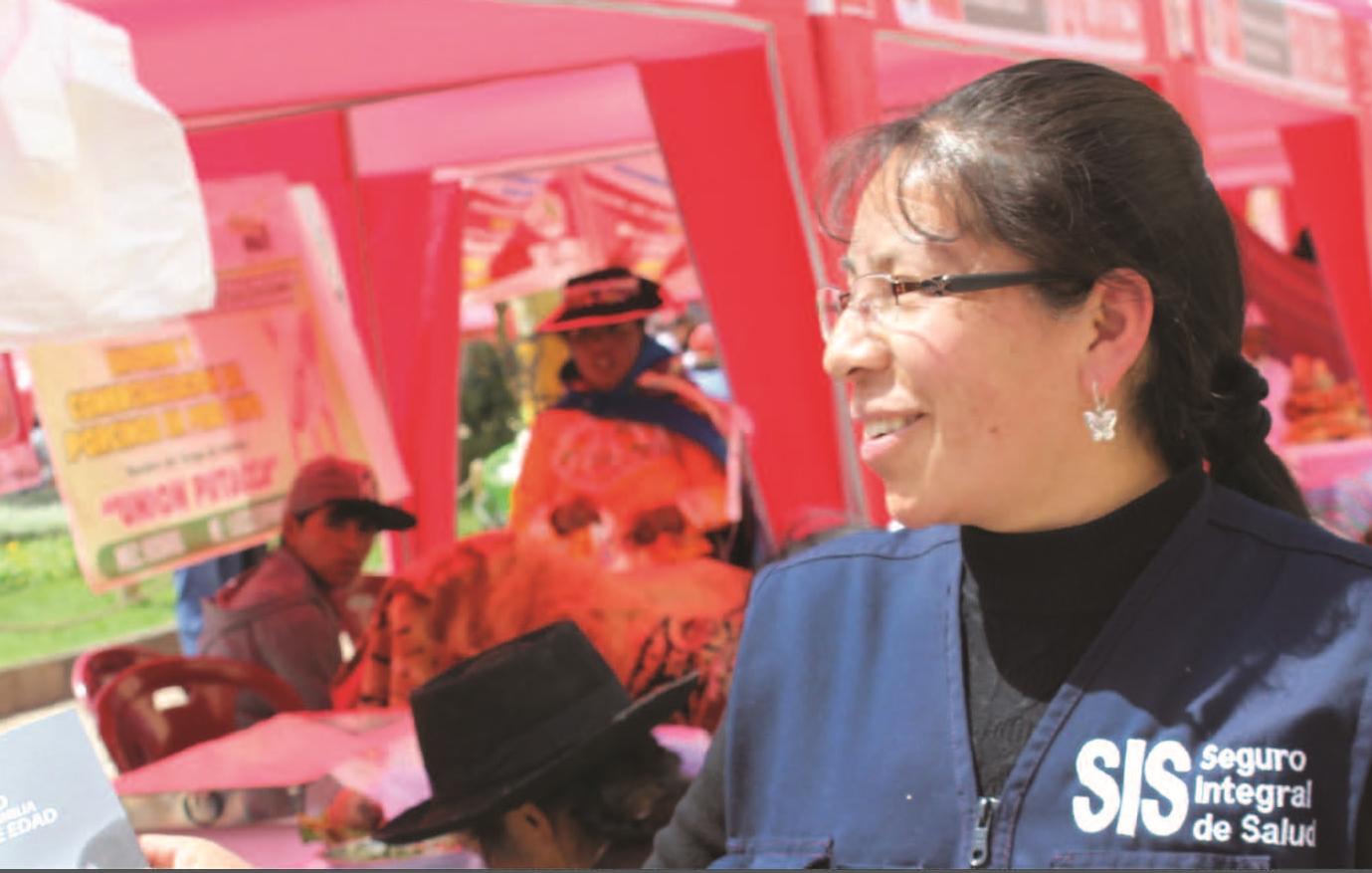
Más de 12.000 personas podrán ejercer sus derechos y deberes en salud en Huancavelica y Junín
Guido COUCK | 09/10/2018
El 26 y 27 de septiembre se desarrolló el evento de cierre del programa de apoyo a la política de aseguramiento universal en salud en el Perú en Saccsamarca (Huancavelica) y Layan Pata (Junín). El evento forma parte del programa de cooperación entre Bélgica y Perú en cinco regiones del país y a nivel nacional con el objetivo de mejorar los servicios de salud y el aseguramiento universal. Las regiones priorizadas fueron San Martín, Cajamarca, Piura, Junín y Huancavelica, zonas con población en situación de pobreza y pobreza extrema.De esta manera, hace dos años, en Huancavelica se dió inicio al programa de formación para formadores en derechos y deberes en salud y aseguramiento universal, como una propuesta para informar y empoderar a la población sobre sus derechos y deberes en salud, y brindar asesoría sobre las consultas y reclamos en relación al seguro integral de salud. Esta propuesta germinó y se empezó a implementar también en San Martín, Cajamarca y Junín.Durante el evento de cierre, Patrick Gaudissart, representante de la agencia belga de desarrollo, declaró: “En Huancavelica hemos trabajado muy cerca del Programa PAIS, quienes están más cerca a la población, así como el Seguro Integral de Salud, Susalud y otros aliados locales para lograr la sostenibilidad. En este evento queremos agradecer a todos ellos, quienes nos han permitido estos resultados.” En ambas zonas, como parte del evento, se realizaron sesiones de aprendizaje, donde los y las gestores lograron demostrar cómo se viene trabajando las réplicas. Estas réplicas han sido planificadas e incorporadas en sus planes operativos y permitirán llegar a casi 9000 personas en Huancavelica y 3500 en Junín, al finalizar el año.Este acercamiento permitirá llegar a población de las zonas más vulnerables y estrechar las brechas de afiliación y derecho a la salud, por ello se busca que el programa de formación desarrollado en la región de Huancavelica y Junín, sea extendido a nivel nacional.
-
La Formation en Alternance en faveur des jeunes, passerelle directe vers l’entrepreneuriat
Michael MALEMBA | 09/10/2018
Le projet pilote de formation en alternance initié par le programme, compte 188 jeunes étudiants issus de 8 Centres d’Applications (CDA). Cette expérience innovante se déploie en faveur des filières agricoles, vétérinaire, de transformation alimentaire et de mécanique générale. 8 entreprises issues des bassins d’emploi de Mbuji-Mayi et Ngandajika, ont permis aux futurs lauréats, de confronter leurs compétences pratiques dans le cadre d’une mise en situation réelle de travail. Les Unités Formation Emploi (U.F.E) adossées aux CDA, ont permis à ces jeunes désireux de se positionner vers l’auto-emploi, de bénéficier d’un accompagnement à l’entreprenariat visant la formulation de projets viables. 36 de ces lauréats sortants, encadrés par des artisans locaux, ont démarré les activités de 4 micro entreprises agricoles, de petit élevage ou encore de menuiserie. La formation en alternance a constitué un véritable passeport pour l’entreprenariat, permettant à ces jeunes d’acquérir les compétences techniques indispensables à la création d’une micro entreprise. La création de ces entreprises multipliera les espaces d’apprentissages propices à l’accueil d’autres jeunes dans le cadre de la formation en alternance et/ou en stage. Dès la rentrée scolaire 2018, le projet pilote de formation en alternance a redémarré en incorporant de nouvelles entreprises partenaires, passant ainsi à 10 conventions conclues avec le secteur privé. L’objectif est identique : accueillir, former et doter les jeunes apprenants des outils et compétences nécessaires pour une insertion professionnelle réussie. EQUIPE EDUKOR
